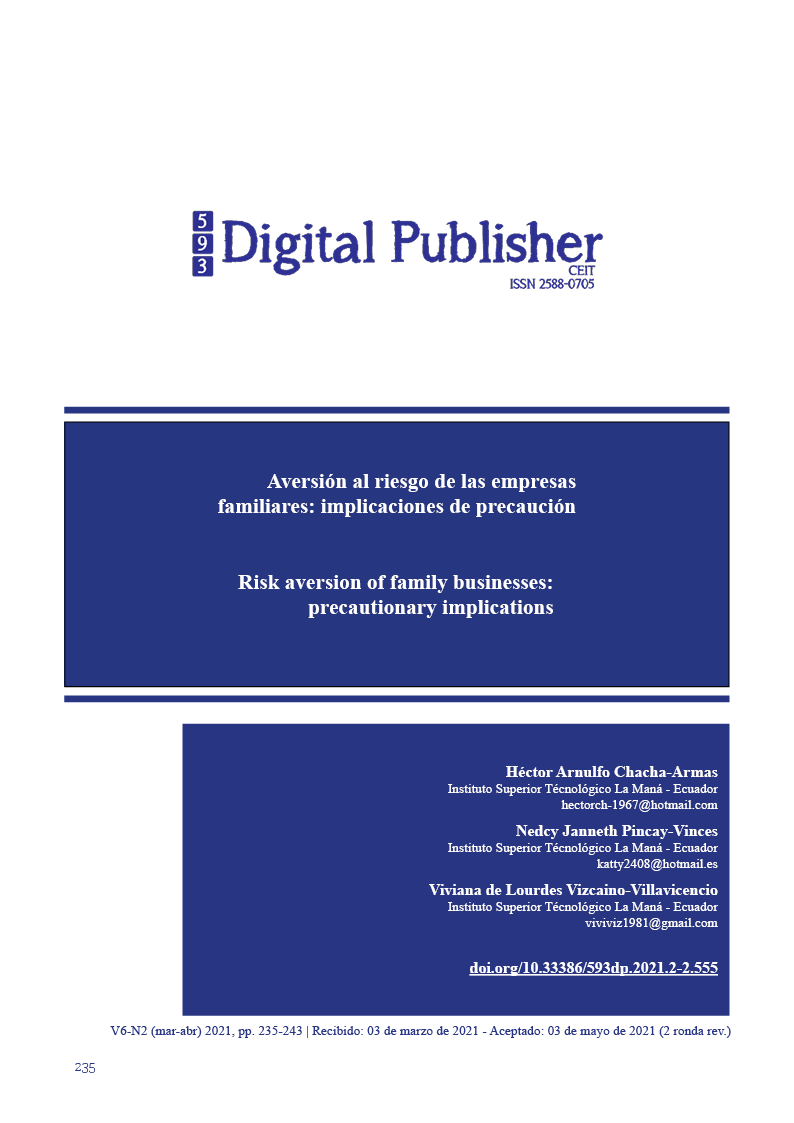Risk aversion of family businesses: precautionary implications
Main Article Content
Abstract
The present work aims to explore the limitations of risk aversion in family businesses. In the same way, it is suggested how a balance can be achieved between risk-taking and risk aversion, in relation to the non-economic objectives typical of management families. The method used is qualitative and grounded theory, since it exposes one of the problematic realities that small or family companies face in relation to the injection of capital, third-party links and wasted growth opportunities. The implicating result shows that family business managers (leaders) exhibit aversion to risk, which is denoted as a risk factor and long-term survival of the organization. However, it is suggested to balance risk taking by including external knowledge and capital.
Downloads
Article Details

This work is licensed under a Creative Commons Attribution-NonCommercial-ShareAlike 4.0 International License.
1. Derechos de autor
Las obras que se publican en 593 Digital Publisher CEIT están sujetas a los siguientes términos:
1.1. 593 Digital Publisher CEIT, conserva los derechos patrimoniales (copyright) de las obras publicadas, favorece y permite la reutilización de las mismas bajo la licencia Licencia Creative Commons 4.0 de Reconocimiento-NoComercial-CompartirIgual 4.0, por lo cual se pueden copiar, usar, difundir, transmitir y exponer públicamente, siempre que:
1.1.a. Se cite la autoría y fuente original de su publicación (revista, editorial, URL).
1.1.b. No se usen para fines comerciales u onerosos.
1.1.c. Se mencione la existencia y especificaciones de esta licencia de uso.
References
Arraut, L. (2010). La gestión de calidad como innovación organizacional para la productividad en la empresa Quality Managemen as an Organizationa Innovation for th Productivity of th. Revista Escuela de Administración de Negocios, 69(2), 20-41. Recuperado de http://www.redalyc.org/pdf/206/20619966002.pdf
Blumentritt, T. (2014). Integrating strategic management and budgeting. Journal of Business Strategy, 27(6), 73-79. https://doi.org/10.1108/02756660610710382
Casillas, J.C., Moreno, A.M. and Barbero, J.L. (2011), “Entrepreneurial orientation of family firms: family and environmental dimensions”, Journal of Family Business Strategy, Vol. 2 No. 2, pp. 90-100.
Craig, J. and Moores, K. (2005), “Balanced scorecards to drive the strategic planning of family firms”, Family Business Review, Vol. 18 No. 2, pp. 105-122.
Croci, E., Doukas, J.A. and Gonenc, H. (2011), “Family control and financing decisions”, European Financial Management, Vol. 17 No. 5, pp. 860-897.
Chirinos, Y., & Pérez, C. (2016). La Responsabilidad Social Universitaria: emprendimiento sostenible como impacto de intervención en comunidades vulnerables. Rev. esc.adm.neg., 81(2), 91-110.
Del Valle, Y., Cordova, V., & Meriño, Y. (2018). Emprendimiento sostenible: Una opción para el crecimiento local. UDI, 11(1), 105-116.
Di Giuli, A., Caselli, S. and Gatti, S. (2011), “Are small family firms financially sophisticated?”, Journal of Banking and Finance, Vol. 35 No. 11, pp. 2931-2944.
George, G., Wiklund, J. and Zahra, S.A. (2005), “Ownership and the internationalization of small firms”, Journal of Management, Vol. 31 No. 2, pp. 210-233.
Gómez-Mejía, L.R., Haynes, K.T., Núnez-Nickel, M., Jacobson, K.J.L. and Moyano-Fuentes, J. (2007), “Socioemotional wealth and business risks in family-controlled firms: evidence from Spanish olive oil mills”, Administrative Science Quarterly, Vol. 52 No. 1, pp. 106-137.
González, M., Guzmán, A., Pombo, C. and Trujillo, M.-A. (2013), “Family firms and debt: risk aversion versus risk of losing control”, Journal of Business Research, Vol. 66 No. 11, pp. 2308-2320.
Hiebl, M.R.W. (2013), “Risk aversion in family firms: what do we really know?”, The Journal of Risk Finance, Vol. 14 No. 1, pp. 49-70.
Hiebl, M.R.W. (2014), “A finance professional who understands the family: family firms’ specific requirements for non-family chief financial officers”, Review of Managerial Science, Vol. 8 No. 4, pp. 465-494.
Kaplan, R.S. and Norton, D.P. (1992), “The balanced scorecard: measures that drive performance”, Harvard Business Review, Vol. 70 No. 1, pp. 71-79.
Klatt, T., Schlaefke, M., & Moeller, K. (2011). Integrating business analytics into strategic planning for better performance. Journal of Business Strategy, 32(6), 30-39. https://doi.org/10.1108/02756661111180113
Le Breton-Miller, I., Miller, D. and Lester, R.H. (2011), “Stewardship or agency? A social embeddedness reconciliation of conduct and performance in public family businesses”, Organization Science, Vol. 22 No. 3, pp. 704-721.
León, A., & Varella, M. (2011). La rentabilidad como fuente de crecimiento y sostenibilidad en el entorno empresarial. Ciencias Económicas, 29(1), 531-544.
López, J. (2012). Modelos actitudinales y emprendimiento sostenible. CUIDES, (8), 111-131.
Martín, M., Bermúdez, G., Li, Z., & Parra, F. (2018). Modelo de administración de marcas un enfoque teórico basado en la teoría general de system. Esic Market Economics and Business Journal, 49(1), 93-117. https://doi.org/10.7200/esicm.159.0491.2e
Meriño, V., Martínez, C., & Pérez, C. (2018). Emprendimiento sostenible para el desarrollo económico de las PYMES. Revista Espacios, 39(07), 3-14.
Mittal, A. (2013). E-commerce: It’s Impact on consumer Behavior. Global Journal of Management and Business Studies, 3(2), 131-138. Recuperado de http://www.ripublication.com/gjmbs.htm
Mitter, C., Duller, C., Feldbauer-Durstmüller, B. and Kraus, S. (2012), “Internationalization of family firms: the effect of ownership and governance”, Review of Managerial Science, Vol. 8 No. 1, pp. 1-28.
Nagar, R., & Road, H. (2010). Motivators and decisional influencers of online shopping Bikramjit Rishi. International Journal Business Innovation and Research, 4(3), 195-209.
Olšiaková, M., Loučanová, E., & Paluš, H. (2016). Monitoring changes in consumer requirements for wood products in terms of consumer behavior. Acta Facultatis Xylologiae, 58(1), 137-147. https://doi.org/10.17423/afx.2016.58.1.15
Paisner, M.B. (2000), Sustaining the Family Business: An insider’s Guide to Managing Across the Generations, Basic Books, New York, NY.
Robalino, A., Ramos, V., Unda, X., & Román, J. (2017). Gestión empresarial y análisis de ventajas competitivas. Portafolio de negocio de las telefónicas en Ecuador. CienciAmérica, 6(3), 1-6.
Rodríguez, D. (2016). Emprendimiento sostenible, significado y dimensiones. Revista Katharsis, (21), 419-448.
Sepulveda, C., & Gutierrez, R. (2016). Sostenibilidad de los emprendimientos: Un análisis de los factores determinantes. Revista Venezolana de Gerencia, 21(73), 33-49.
Su, W. and Lee, C.-Y. (2012), “Effects of corporate governance on risk taking in Taiwanese family firms during institutional reform”, Asia Pacific Journal of Management, Vol. 30 No. 3, pp. 809-828.
Torres, D., Vega, D., & Spencer, E. (2007). Ventajas competitivas en empresas Multilatinas de origen chileno. Universidad de Chile.
Villalobos, L., Sánchez, M., & Zavala, D. (2007). Sostenibilidad y emprendimiento venezolano: visión contextualizada desde sus actores. RUAnova, 36(1), 36-48.
Weber, P., Geneste, L., & Connell, J. (2015). Small business growth: strategic goals and owner preparedness. Journal of Business Strategy, 36(3), 30-36. https://doi.org/10.1108/JBS-03-2014-0036
Wang, Y. and Poutziouris, P. (2010), “Entrepreneurial risk taking: empirical evidence from UK family firms”, International Journal of Entrepreneurial Behaviour & Research, Vol. 16 No. 5, pp. 370-388.
Wheelen, T. L., & Hunger, J. D. (2007). Administración estratégica y política de negocios (Conceptos y casos) (Décima). México D.F.: Pearson education.
Yam, B., Limbu, C., Jayachandran Barry, J., & Babin, P. (2016). Empathy, Nonverbal Immediacy, and Salesperson Performance: The Mediating Role of Adaptive Selling Behavior. Journal of Business & Industrial Marketing, 31(5), 1-45.
Zahra, S.A. (2005), “Entrepreneurial risk taking in family firms”, Family Business Review, Vol. 18 No. 1, pp. 23-40.




